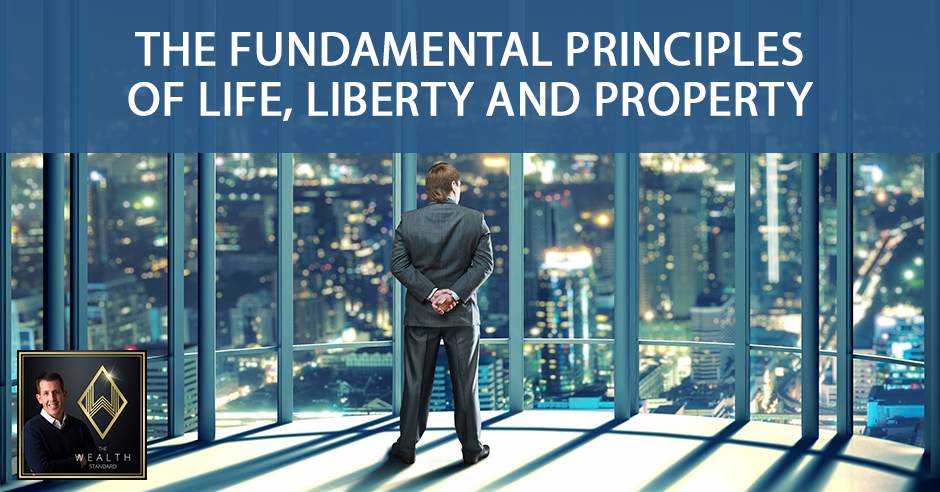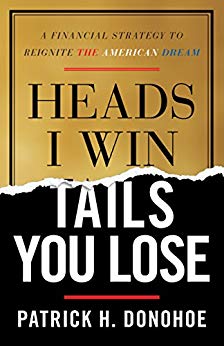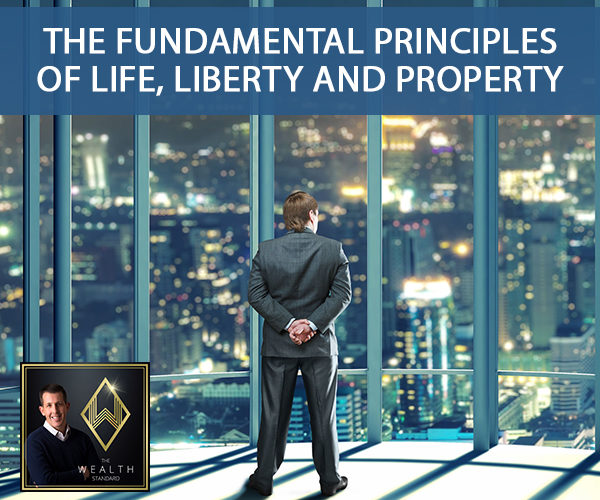The Fundamental Principles Of Life, Liberty And Property
Podcast: Play in new window | Download

Life isn’t perfect, and it’s never going to be. We’re all human beings and we’re fallible. At the same time, we have so much capability, and where we thrive is typically where things are the most disruptive. In this 2018 wrap-up episode, take a look back at the fundamental principles of progress and prosperity, namely, life, liberty, and property that led to why we have experienced so much prosperity in our day and age. Notable guests like Garrett Gunderson, Jaireck Robbins, Peter Gray, Connor Boyack, George Gilder, James Arthur Ray, Angela Duckworth, Jonas Sachs, Mike Cobb have graced the show to add value, share important resources, and help you understand what your goal is. As 2019 kicks off, Patrick’s vision is for you to understand the principles of capitalism and how it relates to you at an individual level so that you can achieve the goals and ambitions that you have. Join us for another year of high-impact discussion about capitalism, not just from Patrick but from other people that are authors, organization presidents, and intellectuals.
—
Listen to the podcast here:
Watch the podcast here:
The Fundamental Principles Of Life, Liberty And Property
The 2018 Wrap-Up
We are going to be officially wrapping up the final season of 2018, actually all the three seasons of 2018. Introducing the new season and the theme that we’re going to be using. I think you are going to love it. First off, happy new year to everyone. I hope you guys had an amazing holiday. I wanted to kick everything off with a story. First, I believe that as human beings, we have some incredible things that we’re capable of. At the same time, we have these subconscious habits that rule our lives. It’s the majority of our thinking, the majority of our behavior. If you look at the limitations that we often have that prevents us from getting to the next level, whether it’s in our career, whether it’s in relationships and so forth, it’s because of some preconditioned habit.
This is a funny story about my family. We spent Christmas with my wife’s family. They drove up and they hadn’t had Christmas together in years. Then on the 26th, we went over to Denver where my brother lives and his family. We drove from Salt Lake to Denver and it was a pretty long drive. It was awesome. The kids get along well. We didn’t have any issues or the drama, but on the way back is where we had some drama. My wife for better and for worse got my four-year-old son in the habit of if he had to go to the bathroom on some of these long trips, and we’ve driven him to California before and to Arizona. Instead of stopping every half an hour or an hour, she’ll have him pee in a cup. The condition was that if you have to go to the bathroom typically in a long trip, he would pee in a cup or pee in a bottle and throw it away when we got to our stop. We were coming back from Denver. It was on New Year’s Day and Synthia, my wife, was on the passenger seat and she was sleeping. My two older girls, Hannah and Meghan, were sleeping too. I had my headphones on. I was listening to information about this upcoming 2019 season.
Before I knew it there was this screeching scream that disrupted me. It got everybody awake. What had happened is Jack, my four-year-old, had realized that everyone was asleep, and I was on my earphones and couldn’t hear him. He had to go to the bathroom. His habit was to find a cup. He found a cup and he essentially started peeing in the cup. I had hit a bump and he accidentally dropped the cup and couldn’t stop peeing and peed all over Hannah, my fourteen-year-old. The hysterical screams did not come from Jack. They came from Hannah who unfortunately had her sleep disrupted and Jack was sitting there frozen. It was one of those traumatic events for him most likely that the habit is broken. At the same time, Hannah, obviously I had to pull over and calm her down a little bit because she was pretty hysterical.
We're meant to produce. We're meant to create value for as long as possible, not stopping at some point in the future. Click To TweetThe Fundamental Principles
Anyway, this is a funny story relating to the principle of habit. The reason why I’m bringing that up is that all of the previous year, the idea was to talk about some of the fundamental principles that led to why we have experienced so much prosperity in our day and age. What we experienced on a daily basis, they were dreams. They weren’t even dreams. It’s something that people 100 years ago couldn’t even conceptualize. If you look at the roots of how that occurs, what principles that progress and prosperity is based on; life, liberty and property, is the reason why I wanted to bring that to the surface so that you would understand those foundational principles. They applied as much to the future as they did to the past. I would say even more so to the future. The idea was, as far as life, liberty and property, is to bring it down to the individual level.
We had guests like Garrett Gunderson was on there. We talked about The Law of Success In Sixteen Lessons which was an instrumental book for me, understanding a lot of these principles and what’s possible for a human being. What would it be possible for me? We had Jairek Robbins on there who is one of the most inspirational guys that I know, younger guys. He has some incredible things to say about what we’re capable of and also what holds us back and practical things that we can do to overcome our limiting beliefs and some of those habits and subconscious behavior that we all have. We talked to Peter Gray who was a BC professor. He specializes in education for children and had a completely different view than the typical view of our education system right now, which has more flaws than we can discuss on multiple podcasts. That was a fascinating discussion with him. We had John Rampton on there, who’s a serial entrepreneur that I know. We had the Founder of UGG boots, Brian Smith.
Liberty

Heads I Win, Tails You Lose: A Financial Strategy to Reignite the American Dream
We kick off with liberty, which is the second principle. Life is the first principle. Liberty is the second principle, with Connor Boyack who is the President of the Libertas Institute. The idea of liberty as we framed it in an individual level is the pursuit of financial freedom, the pursuit of freedom as an individual. Not the financial notion of retirement, which is to stop working, to stop producing. This is where a lot of the companies that I spend the majority of my time do is educate people that the typical financial planning model is principally flawed because it’s getting people to defer life until some future date. At that point in time, instead of being dependent on an employer, now you’re dependent on market performance and a financial advisor in Wall Street to help you with your income throughout retirement. It’s one of those things where I’ve seen it to be destructive to what is capable of a human being. If they would realize that the notion of retirement is not in alignment with our human nature. We’re meant to produce. We’re meant to create value for as long as possible, not stopping at some point in the future.
Plus, if you look at longevity and the amazing innovation associated with healthcare, we’re going to be living longer. The idea of saving 5% to 10% of your income for 30 years and then living off of that for 30 years, the math doesn’t make sense. Market performance has shown that it’s not capable of providing the returns that will allow you to do that. We went through the second season and talked into great detail about how to achieve financial freedom. That was around the time where my book was released, which was the first one I’d ever written. It took me a couple of years to do it. It’s Heads I Win, Tails You Lose: A Financial Strategy to Reignite the American Dream. Thank you so much for all those who provided tons of feedback and bought the book. It took a long time but I’m grateful that it came out and did emphasize a lot of the philosophy that you, longtime audience, had been hearing, but put it in a more organized, condensed fashion. That was in the summer.
We finished off the year with interviews with George Gilder who is an investor and an author and is a lot older in age, but his experience shows the cyclical nature of how things work and what is on the horizon. That was a fascinating conversation with George. Then James Arthur Ray, if you guys are familiar with him. He had a fall from grace in a sense a number of years ago and went to prison but is one of the most profound types of speakers on personal development. It was awesome to hear his story and all that he went through during those times and how he got back on track and what he’s focused on now. Then we had Angela Duckworth who’s the author of Grit. She has the second or third most-watched TED Talk of all time, it’s behind Simon Sinek. That was an awesome conversation. She’s a psychologist and has a lot of training in human behavior and how we behave and how we act.
Then we had Jonah Sachs who wrote Winning the Story Wars and he has another book called Unsafe Thinking, which is targeting how disruptive the employment industry is and how people are not taking risks. It’s a fascinating idea. Then finally, Mike Cobb, I’ve known him for a number of years. The coincidence was he had wrote an article talking about John Locke’s life, liberty and property and how that pertained to the real estate investment industry globally. It was fascinating to have a discussion with him, which was the second to last episode of 2018. Then we ended with David Neagle, who is instrumental in creating the personal development space and industry.
Maximize who you are, your human life value assets, which are the assets that are the most valuable to other people. Click To TweetIt was an awesome season. I benefited personally because I got to talk all the time about these three foundational principles of our well-being, of what we’re all after and the foundational things. If they’re there, if they’re focused on, then essentially they could be maximized whether it’s life, use your best asset, figuring out ways to invest in yourself and be of more value to other people which will bring more money. The best investment you could ever make is to maximize that. The idea is to achieve this profession or career where you’re doing what you love that gets you out of bed in the morning but also is in an environment where it’s conducive to how you operate that gives you that fulfillment and achievement. Most people aren’t focused on that. They’re focused on sacrificing now for the benefit of tomorrow and differing life now. Rationally, it doesn’t make sense if you think about it. Figuring out how to leverage what’s going on in the US now and in the world, where we’re becoming this online society.
Property
There are opportunities to provide value to other people in so many thousands of different respects. Being able to pursue how to maximize who you are, what we consider your human life value assets, which are the assets that are most valuable to other people. They’re different for all human beings. Then also discovering your human life value liabilities, which is the stuff that you’re not good at, that people typically put up with instead of finding others that could provide that service and value better than you. That’s the idea of creating financial statement around who you are, your human life value assets, what you’re best at, your talents, abilities, strengths and your human life value of liabilities, which is the stuff you’re not good at, delegating that and maximizing the assets. That’s going to create this notion of freedom. Then finally property, which is the physical world. I’ve talked about this for years on the show. Putting it into the context of what John Locke talked about. This was during a time where there wasn’t much difference between that time and the zero AD, as we came into this new era. People rode around on horses and buggies and they ate in a very similar fashion, they had similar clothes.
John Locke had discovered right through his mentors and thinking and going to school. He discovered some principles that ultimately influenced the Scottish enlightenment, with David Hume and Adam Smith, which ultimately influenced the creation of the United States in our foundational documents, The Declaration of Independence and The Constitution. Getting into the property helped me identify that when you have the principle, the right of life and celebrating that as well as liberty, your freedoms, that property, the resources of the world can be used and aligned with those two other principles. Let me give you some examples. Back then with John Locke, how he understood property wasn’t just a piece of land. It was the material world. Look at what humankind has created with first understanding their mind and the value of that asset. Then looking at the world around them and using those resources to create value for others.

2018 Wrap-Up: Capitalism, according to Ayn Rand, is the ideal structure so that humankind can progress at the maximum level possible.
The abundance that we live in right now is hard to fathom if you take a step out of the here and now. We have incredible technology for communication. We have incredible technology to leverage people around the world and their strengths to form a business. You have transportation technology, healthcare, technology, all things that are allowing human beings not to have to be afraid of surviving which has been a fear of society for a long time. We don’t have to even think about that anymore. The idea then and how the world was then and how it is now and associating our progress with all of that was valuable to me because I started to look at the world in a multitude of contexts. How much we’ve benefited from these simple ideas.
Hopefully, you got some value out of it as well. Maybe some of you had gone into reading some of John Locke’s texts. His treatises of government as well as some of the other books by some of those that were revolutionary in the ideas that help spawn the United States formation. I hope you’ve got tons of value out of that. I certainly did, and it’s led into a new theme for this year, which is I believe a taboo word or concept or idea that fits right alongside politics and religion. This is the word, capitalism. That’s going to be our theme for 2019. What it is? What it isn’t? Why it’s so reviled but also so celebrated? The structure of capitalism is the embodiment of what we talked about in 2018. Understanding it from a macro level, a group or a global level, as well as an individual level, is what my goal is.
Capitalism
My vision is for you to understand the principles of capitalism and how profound of a system it is and how it relates to you at an individual level so that you can achieve the goals and ambitions that you have. I always benefit from seeing, not conflict, but when there are very widespread opinions where you have at one end of the spectrum an opinion and then another. Both are very strong but on both sides of the spectrum. This is definitely capitalism. It’s been blamed for all sorts of atrocities, let alone the 2008, 2009 great recession. It’s been blamed for the exploitation of children.
Life isn't perfect; it's never going to be. Click To TweetAyn Rand, who I came to understand in 2005 and 2006, celebrates it as the ideal structure so that humankind can progress at the maximum level possible. Her strong opinions versus the other side of the spectrum are evident in society now. As you guys learn about capitalism, not just from me, but from some of the people who are authors, organization presidents and other intellectuals. They’re going to be guests. You’re going to learn a ton of what it is, what it isn’t and how it relates to not only the macro side of the world but also at an individual level for you specifically. Some of the guests that we have, Yaron Brook from Ayn Rand Institute. We have Lawrence Reed from the Foundation for Economic Education. We have Joel Skousen, Connor is going to be on as well. G. Edward Griffin who wrote The Creature from Jekyll Island is on there. My buddy, Jason Rink, is going to be on there. There are going to be some incredible guests and some incredible dialogue associated with capitalism. You’ll definitely see where I stand as far as the philosophical point of view and what I’m doing about it. Organizations I support, how I analyze investments and how I analyze businesses and opportunities as well as my own business and own investments. It’s going to be beneficial to you too.
I have a bunch of other notes as far as some of the ways in which I view capitalism and view how important it is to me. I’m going to leave that for the season. I’m going to talk about one more thing. If you guys want to start to follow along with this theory. I would recommend that you pick up Ayn Rand’s book which is Capitalism: The Unknown Ideal. Milton Friedman also has an incredible book called Capitalism and Freedom. If you haven’t read Atlas Shrugged, maybe we’ll do a season on that one of these days. That’s a profound book that is very misunderstood as far as what the messages are and aren’t. If you want to pick up some literature and dive into this topic, then I definitely think that those books will give you a good idea of what some of these principles are and how they apply to the modern world.
I’ll leave it at that. If you have any comments, make sure you’re emailing us at Podcast@ParadigmLife.net or Hello@TheWealthStandard.com. We’re going to do something different. We’re going to keep doing these seasons. The seasons are primarily based on philosophy. In 2018, it was life, liberty and property. That’s what we’re going to continue to do this year with the main podcast, but on Fridays, we’re going to do something called Financial Fridays. I’ve been accumulating some interviews that I’ve done with specific financial strategy. We’ll have investment strategy on there. We’ll have specific investments, not typical mainstream investments like a mutual fund or a stock. We’re going to use more of the alternative investments that are out there. There are a number of people that I’ve interviewed and we’re going to play those. We’re going to kick it off with how I look at investment, which is from a hierarchical standpoint as far as tearing the different types of investments and how do you categorize them. That will be the first episode. I have some people I invest with as well as those who have participated in the Cash Flow Wealth Summit, which is a virtual event that we put on every year.

2018 Wrap-Up: As human beings, we have so much capability, and where we thrive is typically where things are the most disruptive.
That’s going to be on every Friday, fifteen to twenty minutes, sometimes 30 minutes. I tend to want to do some short episodes. I love talking. I love conversations with people, especially stimulating conversations. Sometimes those will bleed over from 15 to 20 to 30 minutes. We’re going to try to keep them shorter, but they’re all focused around practical financial strategy. That’s it. Hopefully, you had a great end to 2018. I hope you’re ready to crash it in 2019. I look at what’s going on with the government shut down. I look at a lot of signals that are showing me that there is major disruption on the horizon. I don’t think what we’ve experienced over the last couple of months with market volatility is anything. I think that’s a blip on the radar. I believe that we’re going to have an incredible five to ten years of disruption from a technology standpoint, from an education standpoint, from a tax standpoint.
It’s going to be awesome. It’s going to be hurtful for others and painful for others, but I believe that there are going to be some tremendous opportunities that arise because of it. That’s awesome for you. It’s awesome for me because that’s what it’s about. Life isn’t perfect, it’s never going to be perfect. We’re all human beings and we’re fallible. At the same time, we have so much capability. Where we thrive is typically where things are the most disruptive. Thank you for your support. Thank you for allowing me to do this. Feedback is always appreciated as far as questions or things that we can address or other elements to add that you think would be valuable. Make sure you reach out to us. If you haven’t given us a review on iTunes, that helps. It gets the word out. Apple has these algorithms that did help rank and improve the listenership based on the success of the podcast. If you like what you’re hearing, definitely give us a good rating. That would mean a tremendous amount. That’s it. We’ll talk to you next time.
Important Links:
- Garrett Gunderson – past episode
- The Law of Success In Sixteen Lessons
- Jairek Robbins – past episode
- Peter Gray – past episode
- John Rampton – past episode
- Brian Smith – past episode
- Connor Boyack – past episode
- Heads I Win, Tails You Lose: A Financial Strategy to Reignite the American Dream
- George Gilder – past episode
- James Arthur Ray – past episode
- Angela Duckworth – past episode
- Grit
- Jonah Sachs – past episode
- Winning the Story Wars
- Unsafe Thinking
- Mike Cobb – past episode
- David Neagle – past episode
- Ayn Rand Institute
- Foundation for Economic Education
- The Creature from Jekyll Island
- Capitalism: The Unknown Ideal
- Capitalism and Freedom
- Atlas Shrugged
- Podcast@ParadigmLife.net
- Hello@TheWealthStandard.com
- Cash Flow Wealth Summit
- The Wealth Standard Podcast on iTunes
- https://ParadigmLife.net/
- https://HeadsOrTailsIWin.com/
















